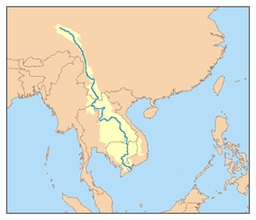Mekong
| Mekong River | |
| Megaung Myit (မဲခေါင်မြစ်), แม่น้ำโขง (Maenam Khong), ແມ່ນ້ຳຂອງ, Mékôngk, Tonle Thom (ទន្លេដ៏ធំ, ទន្លេមេគង្គ), Cửu Long (九龍), Mê Kông, 湄公 (Méigōng) | |
|
A view of the Mekong River at Luang Prabang in Laos
|
|
| Countries | China, Myanmar, Laos, Thailand, Cambodia, Vietnam |
|---|---|
| Tributaries | |
| - left | Nam Khan, Tha, Nam Ou |
| - right | Mun, Tonle Sap, Kok, Ruak |
| Source | Lasagongma Spring |
| - location | Mt. Guozongmucha, Zadoi, Yushu Tibetan Autonomous Prefecture, Qinghai, China |
| - elevation | 5,224 m (17,139 ft) |
| - coordinates | 33°42.5′N 94°41.7′E / 33.7083°N 94.6950°E |
| Mouth | Mekong Delta |
| - elevation | 0 m (0 ft) |
| Length | 4,350 km (2,703 mi) |
| Basin | 795,000 km2 (307,000 sq mi) |
| Discharge | for South China Sea |
| - average | 16,000 m3/s (570,000 cu ft/s) |
| - max | 39,000 m3/s (1,400,000 cu ft/s) |
| Protection Status | |
| Official name | Middle Stretches of the Mekong River north of Stoeng Treng |
| Designated | June 23, 1999 |
The Mekong is a trans-boundary river in Southeast Asia. It is the world's 12th-longest river and the 7th-longest in Asia. Its estimated length is 4,350 km (2,703 mi), and it drains an area of 795,000 km2 (307,000 sq mi), discharging 475 km3 (114 cu mi) of water annually.
From the Tibetan Plateau the river runs through China's Yunnan Province, Myanmar, Laos, Thailand, Cambodia, and Vietnam. In 1995, Laos, Thailand, Cambodia, and Vietnam established the Mekong River Commission to assist in the management and coordinated use of the Mekong's resources. In 1996 China and Myanmar became "dialogue partners" of the MRC and the six countries now work together within a cooperative framework.
The extreme seasonal variations in flow and the presence of rapids and waterfalls in the Mekong make navigation difficult. Even so, the river is a major trade route between western China and Southeast Asia.
The English name "Mekong" derives via Vietnamese from a contracted form of Thai and Lao "Mae Nam Khong". In Thai and Lao, mae nam ("mother of water[s]") is used for any major river and Khong is the proper name. As such, Thai and Lao locals often refer to it in English as the "River Khong".Khong itself, however, is an archaic word meaning "river" or "the river", cognate with Chinese whose Old Chinese pronunciation has been reconstructed as /*kˤroŋ/ and which long served as the proper name of the Yangtze before becoming a generic word for major rivers. In Khmer, Mékôngk is itself glossed as "mother of water", from mé ("mother") and taking kôngk as a form of kôngkea ("water"). The local names for the river include:
...
Wikipedia



